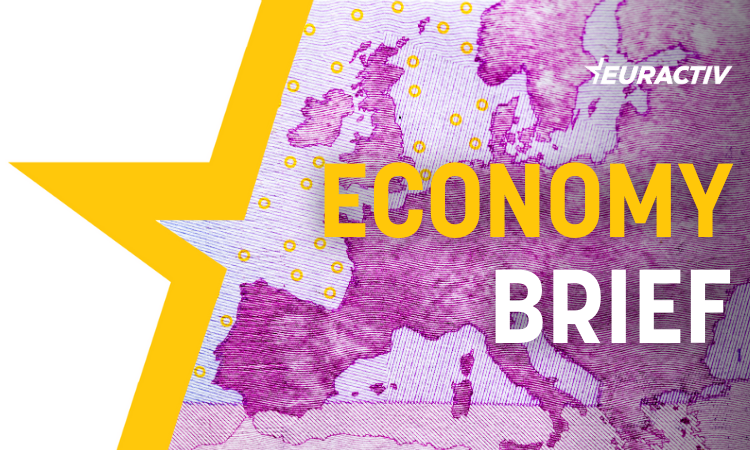
Two weeks ahead of the European elections, the main EU parties’ lead candidates for the next European Commission president met twice this week to discuss their key priorities, with economy featuring prominently – and blurring party lines.
Both debates took place during working hours, suggesting that reaching EU citizens beyond those paid to watch the debate (lobbyists, parliamentary assistants, think-tankers and the like) was not exactly at the top of the organisers’ agenda.
Centrist candidates (i.e., those not sitting at the two extremes of the EU Parliament’s hemicycle) turned in a decent effort to whitewash the ideological differences between their party families.
During Thursday’s (23 May) “Eurovision” debate, Commission President Ursula von der Leyen, the official candidate of the centre-right European People’s Party (EPP), praised the Minimum Wage Directive (a favourite of left parties) and the €21 billion funding devolved to social housing under the post-pandemic joint debt programme of the Next Generation EU (NextGen).
Her Socialist contender Nicolas Schmit, meanwhile, called for more private investments through the strengthening of the bloc’s Capital Markets Union (CMU) – a decade-long plan that von der Leyen has emphasised on several recent occasions – and went as far as quoting a banker on the issue, something he doesn’t “often do”, he admitted.
Liberal candidate Sandro Gozi (Renew Europe) warned against a “green backlash or a green fatigue” but added that it shouldn’t be “farmers and citizens that must pay for the Green transition”.
Green candidate Terry Reintke said that “sustainability” should also mean stable income for farmers – bringing up her family’s farming background twice during the same event – and also called for better cooperation on defence issues.
While several factors could help explain why the two debates provided little help to citizens trying to decide who to vote for, the underlying reason is fundamentally structural: The key conflicts on the economic front are between member states, not EU party families.
This was given away on Tuesday morning by von der Leyen herself, in a pre-debate interview with the FT. Asked about the prospect of issuing new debt at the EU level, she said she was “open” to it but then stressed it would have to be a “pure sovereign decision” of national governments.
In other words, in the economic key question on the future of the EU – if and how to follow up on the NextGen EU, which ends in 2026 – her words could just as easily be interpreted as “your vote in the European Parliament election will not make much difference as the decision on how to finance the bloc’s economy will rest with national governments”.
Reactions to von der Leyen’s statement reinforced that impression.
German liberals, including Finance Minister Christian Lindner (FDP/Renew), chastised on Wednesday for not ruling out the prospect of new joint borrowing, and blamed her centre-right CDU party for breaking with its traditional position of opposing EU-level debt.
Elsewhere, you could ask yourself who the liberal Spitzenkandidat Gozi represents when he calls for new debt-financed EU-wide programmes, such as a European Sovereignty Fund and EU defence bonds.
Similarly, Tuesday’s debate offered vague answers to another thorny issue dominating the agenda in Brussels: How to deal with the much-feared “flooding” of Europe’s markets with artificially cheap Chinese electric vehicles (EVs)?
While von der Leyen called for a “much more targeted, much more tailored” approach than the US’s blanket 100% tariff on Chinese EVs, S&D’s Schmit posted a much more hawkish stance, calling for “more efficient procedures” against foreign subsidies, which he said would be “faster and bolder”.
One could excuse Schmit for going “faster and bolder” on supporting more markedly protectionist measures where the SPD – the German member of his political house – advocates a cautious approach and a free-trade agenda against what they call the “America First” approach pursued by President Joe Biden, while their French counterparts from Place Publique (an ally of the French Socialist Party) want Europe to follow Biden’s hard line.
At their core, the key economic conflicts within the EU are conflicts between national positions.
Hence, if you still don’t know who to vote for on 6-9 June, look at national parties and not at EU debates. As most voters do anyway.
Chart of the Week
Most voters have a good feeling about who calls the shots in the EU: It’s national governments much more than their representatives in the EU Parliament.
Fewer than half (48%) of respondents across the bloc’s 27 countries think their voice “counts” in the EU, compared to 61% in their respective national political systems.
In turn, more than two-thirds (67%) think their country’s voice counts in the EU. Interestingly, the share is highest in those countries that have historically played a “frugal” or more conservative role when it comes to EU spending: Denmark (90%), Sweden (89%), Netherlands (82%), and Germany (81%).
Many professional observers would be on board with the assessment that the frugals are indeed calling the shots, while the parliament is often left out.
Economic Policy Roundup
Paris, Berlin urge EU Tech Deal, ‘forceful reforms’ by next EU Commission. Ahead of June’s EU elections and a new European Commission, France and Germany are looking to set the agenda with a joint paper calling for the adoption of a European Tech Deal and forceful reforms to slash red tape. The report put forward by France’s Bruno Le Maire and German Vice-Chancellor Robert Habeck on Wednesday (23 May) is titled ‘Boosting growth in Europe – a French-German initiative for the next five years’. The paper is not yet officially backed by the German government but will be the basis of top-level discussions between the two governments from 26 to 28 May at the picturesque Meseberg castle, north of Berlin. Read more.
European Commission fines US confectionery giant Mondelez €337.5 million for anti-trust violations. EU competition chief Margrethe Vestager announced on Thursday (23 May) that the food giant, which owns multiple household brands including Cadbury, Oreo, and Cote d’Or, illegally restricted cross-border trade and abused its dominant position in the chocolate market from 2006 to 2020. “[Mondelez] illegally restricted retailers from sourcing these products from member states where prices are lower, and this allowed Mondelēz to maintain higher prices. This harmed consumers who ended up paying more for chocolates, biscuits and coffee,” Vestager said. In a statement, Mondelez said that the Commission’s decision “relates to historical, isolated incidents, most of which ceased or were remedied well in advance of the Commission’s investigation”, which began in 2019.
CMU, competitiveness to take centre stage in next economic policy cycle. In March this year, eurozone finance ministers demanded the upcoming European Commission revive the bloc’s decade-old Capital Markets Union (CMU), mainly by reducing barriers for institutional and retail investors, listing, real-time access to market data, and securitising investment. CMU discussions will take centre stage during the next five-year cycle and likely revolve around boosting investment into riskier and younger companies, streamlining insolvency rules and corporate taxation systems, centralising market supervision, and easing capital requirements for certain asset classes, including securitised products. Read more.
Squabbles between liberal Sandro Gozi and far-right Anders Vistesen dominated the second live debate for the EU executive’s top job in Brussels on Tuesday (21 May), while Commission President Ursula von der Leyen and socialist Nicolas Schmit brought few surprises to the table. At the previous Maastricht event, a high-conviction Commission president defended her case on Green Deal policies, migration, defence, and the Israeli-Gaza conflict against seven other candidates. Conversely, in Brussels, neither von der Leyen nor Schmit – who represented the two largest groups in the EU Parliament – showed much motivation to engage in disputes.
Europe must leverage EU-level public spending to jump-start strategic cross-border business and “take the edge off” private investments that might otherwise be deemed too risky, according to Vice-Chair of the European Parliament’s Committee on Economic and Monetary Affairs Eva Poptcheva. In an interview with Euractiv, Poptcheva, a candidate for the centre-right European People’s Party (EPP) in the European elections after serving as an MEP for the liberal Renew group in the current legislative term, stressed that the EU should step up public funding to crowd in investments in research and development and other strategic areas. “The real strategic investments are cross-border,” said the Bulgarian-born Spanish MEP. “If we want to have really big factories for microchips, let’s do it. But then it has to be a strategic European decision, and then it doesn’t matter if it’s in the Netherlands or in France, or wherever.”
Greek PM urges EU to defend consumers against multinationals. Greek Prime Minister Kyriakos Mitsotakis called on the EU on Monday (20 May) to take on multinationals unfairly restricting the sale of goods in the single market, leading to higher prices for struggling consumers. “The ongoing inflationary crisis across the European continent has also highlighted significant and long-standing problems in the functioning of the markets in essential consumer goods,” Mitsotakis wrote, in a letter sent over the weekend to European Commission chief Ursula von der Leyen and released by his office. Read more.
[Edited by Anna Brunetti/Zoran Radosavljevic]







